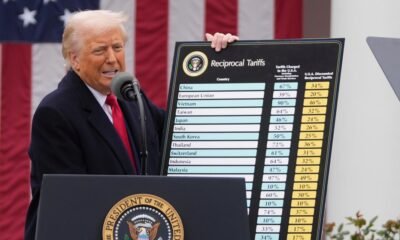2024 election
Immigration Showdown: Trump vs. Harris – Who’s Leading the Charge?

WASHINGTON — The topic of immigration is emerging as a pivotal issue in the lead-up to the 2024 presidential election, with candidates on both sides adopting more hardline stances. GOP candidate Donald Trump has once again placed immigration policy at the center of his campaign, amplifying his rhetoric from previous runs by making incendiary claims about documented migrants in specific areas, such as Springfield, Ohio.
Trump’s speeches are often characterized by demonizing comments aimed at immigrants and a fervent promise of mass deportations for millions of undocumented residents. His campaign statements suggest an aggressive approach, portraying himself as the architect of the largest deportation initiative in American history.
In contrast, Democratic nominee Kamala Harris, aligning with the Biden administration, has also moderated her stance on immigration. She now advocates for stricter asylum criteria and increased border enforcement amidst escalating migrant encounters, which reached historic highs at the end of 2023. Following the implementation of her proposed policies, migrant encounters have significantly decreased this year.
Harris has emphasized a commitment to a bipartisan border security legislation, a potential transformation in U.S. immigration law that faced difficulties in the Senate. The failure of this bill, which received backlash after Trump’s opposition, highlights the complexity of immigration reform and the challenges both parties encounter.
The fate of the Deferred Action for Childhood Arrivals (DACA) program looms large in the upcoming election. This policy shields over half a million undocumented individuals brought to the U.S. as children, yet its legality is under threat from a Texas lawsuit that could elevate the issue to the Supreme Court.
Other pressing immigration topics remain unaddressed by either candidate, including work visa regulations, backlogs in U.S. immigration courts, and the renewal of Temporary Protected Status (TPS) for certain groups. The Trump campaign has refrained from providing detailed comments on these matters, while Harris’s campaign reiterated her acknowledgment of a flawed immigration system during a rally in Arizona.
At the Democratic National Convention, Harris reiterated her commitment to a bipartisan border security deal, advocating for pathways to citizenship alongside tightened border controls. However, significant opposition remains within the party, complicating the prospects for her proposed legislation.
Trump’s proposed agenda, characterized by a promise for mass deportations, reflects an extremist perspective on immigration policy. He has suggested invoking historical laws, reallocating federal resources, and imposing stringent immigration enforcement to achieve his vision.
Additionally, Trump aims to challenge birthright citizenship enshrined in the 14th Amendment, signaling an aggressive interpretation of immigration law that is likely to face legal hurdles.
As unrest continues worldwide, some students protesting U.S. foreign policy have come under scrutiny. Trump has suggested revoking visas for students expressing support for Hamas, taking a controversial stance that aligns with broader party sentiments. He further vowed during campaign events to eradicate “Hamas sympathizers” from academic institutions.
The Biden administration’s humanitarian parole programs, which have facilitated the entry of over a million individuals fleeing conflict, would face repeal under Trump’s administration if he assumes office, as he has pledged to end the misuse of parole authority.
On the flip side, Trump has also discussed pathways to residency for foreign graduates from American universities, indicating potential shifts in policy towards skilled labor acquisition through green cards for graduates.
Furthermore, his campaign plans to introduce “ideological screenings” for immigrants, barring those with potential sympathies toward extremism, underscoring a new layer of scrutiny for prospective entrants. Trump’s agenda appears to promise a return to the aggressive immigration policies from his initial term, including reviving border wall construction and reinstating travel bans for predominantly Muslim countries.


















